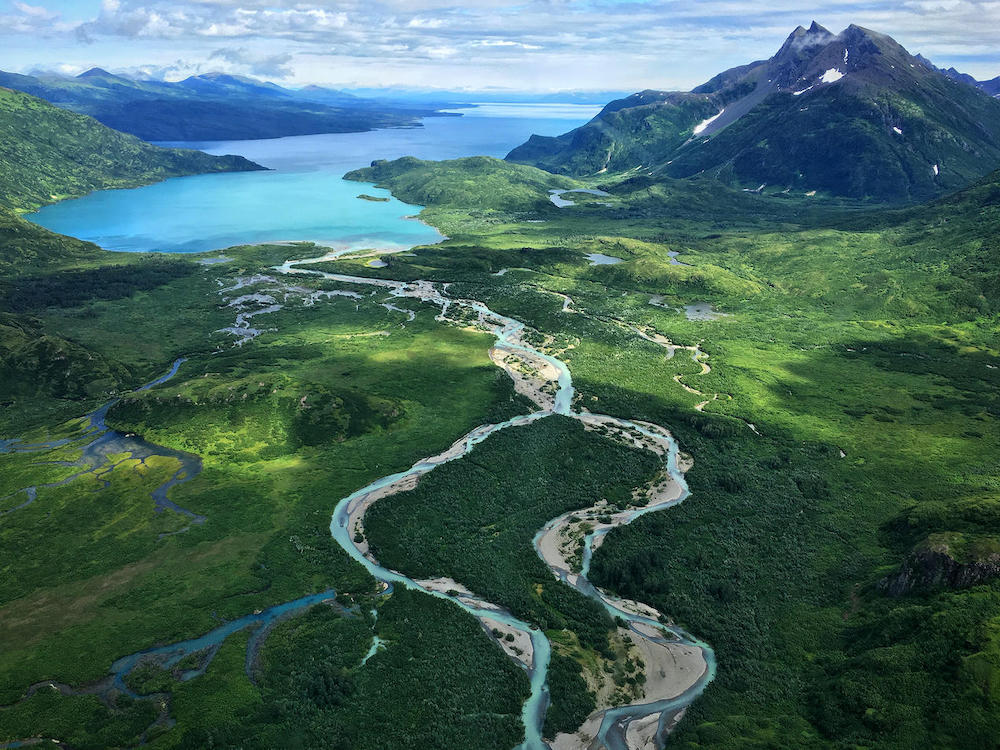
- Details
- By Brian Edwards
WASHINGTON—The Environmental Protection Agency yesterday issued an order that will help protect one of the world’s most productive wild salmon ecosystems by preventing development of the controversial Pebble Mine in Bristol Bay, Alaska.
Using its rarely used authority under Section 404C of the Clean Water Act, the EPA’s final determination limits the use of waters in the Bristol Bay watershed as disposal sites for the Pebble and other mining projects aiming to dig up gold and copper deposits in the area.
The action, which marks just the third time in 30 years the EPA has used its Section 404(c) authority, came after extensive review of scientific and technical research over two decades and “robust” stakeholder engagement, according to the EPA. The research found certain discharges associated with developing the Pebble deposit will have “unacceptable adverse effects on certain salmon fishery areas in the Bristol Bay watershed,” according to an EPA statement.
“The Bristol Bay watershed is a vital economic driver, providing jobs, sustenance, and significant ecological and cultural value to the region,” EPA Administrator Michael Regan said in a statement. “With this action, EPA is advancing its commitment to help protect this one-of-a-kind ecosystem, safeguard an essential Alaskan industry, and preserve the way of life for more than two dozen Alaska Native villages.”
Tribes, environmentalists and policymakers reacted to the EPA ruling, which has been two decades in the making.
“Today is a historical moment in time,” Bristol Bay Native Association President & CEO Garvin Federenko said in a statement. “The people of Bristol Bay have always been stewards of our lands and natural resources with traditional ecological knowledge passed on from generation to generation since time immemorial. Today is a day for celebration with gratitude to EPA, as well as the people of Bristol Bay for being engaged in the process to have our voices heard, and thank you to everyone who has supported our region over the past two decades.”
Representative Mary Peltola (D-AK), who ran for office on a “pro-fish” policy platform, joined Federenko and others in celebrating the decision.
“Rebuilding our salmon runs and protecting our fish was the number one reason I decided to run for Congress,” Peltola said in a statement. “Today, the EPA listened to Alaskans and helped us do just that.”
Protecting Bristol Bay and the world’s largest sockeye salmon fishery has been a bipartisan effort from the very beginning, Peltola said. “After decades of regulatory uncertainty, I hope that this ruling gives the people who live and work in Bristol Bay the stability and peace of mind they deserve and the confidence that this incredible salmon run will no longer be threatened.”
Bristol Bay provides half the world’s wild sockeye salmon and supports 15,000 jobs, generating $2.2 billion in economic activity every year, according to nonprofit Natural Resources Defense Council (NRDC). If fully developed, the Pebble Mine would produce more than 10 billion tons of mining waste requiring storage, forever, in a wet and seismically active region, NRDC wrote in a statement.
The EPA’s ruling is “an existential win” for Bristol Bay, the region’s tribes and communities, NRDC Western Director and Senior Attorney Joel Reynolds said in a statement. “The wild salmon fishery of Bristol Bay is a national treasure …. EPA’s decision is a victory for science over politics, people over profits, and biodiversity over extinction. The battle against the Pebble Mine has pitted an essentially eternal supply of food against an essentially eternal threat of irreparable harm—and today the planet won.”
The top executive of Pebble Limited Partnership, the company behind the mining project, called the EPA’s action unlawful and threatened litigation.
“Unfortunately, the Biden EPA continues to ignore fair and due process in favor of politics,” John Shively, the partnership’s chief executive, said in a statement. “This preemptive action against Pebble is not supported legally, technically, or environmentally. As such, the next step will likely be to take legal action to fight this injustice.”
Senator Lisa Murkowski (R-AK) said the EPA’s determination should “mark the end of Pebble,” but called on the Biden Administration to advance other mining projects in Alaska to help reduce foreign dependence and prevent shortages.
“To be clear: I oppose Pebble,” Murkowski said in a statement. “To be equally clear: I support responsible mining in Alaska, which is a national imperative. This determination must not serve as precedent to target any other project in our state, and must be the only time EPA ever uses its veto authority under the Clean Water Act in Alaska.”
More Stories Like This
Gwich'in Tribal Governments Submit Comments Challenging Fish and Wildlife Service's Inadequate Environmental Review of Arctic Refuge Snow RoadRappahannock Tribe Challenges 9M-Gallon Water Plan
Feds release draft long-term plans for Colorado River management
Apache Leader Walks 60 Miles to Court Hearing That Will Decide Fate of Sacred Oak Flat
Rappahannock Tribe Raises Sovereignty and Environmental Concerns Over Caroline County Water Permit
Help us defend tribal sovereignty.
At Native News Online, our mission is rooted in telling the stories that strengthen sovereignty and uplift Indigenous voices — not just at year’s end, but every single day.
Because of your generosity last year, we were able to keep our reporters on the ground in tribal communities, at national gatherings and in the halls of Congress — covering the issues that matter most to Indian Country: sovereignty, culture, education, health and economic opportunity.
That support sustained us through a tough year in 2025. Now, as we look to the year ahead, we need your help right now to ensure warrior journalism remains strong — reporting that defends tribal sovereignty, amplifies Native truth, and holds power accountable.
 The stakes couldn't be higher. Your support keeps Native voices heard, Native stories told and Native sovereignty defended.
The stakes couldn't be higher. Your support keeps Native voices heard, Native stories told and Native sovereignty defended.
Stand with Warrior Journalism today.
Levi Rickert (Potawatomi), Editor & Publisher


